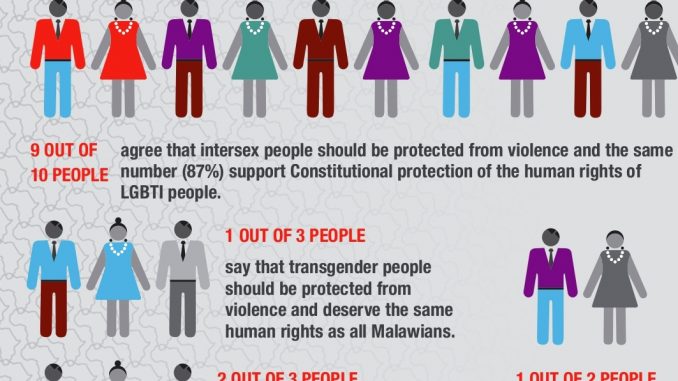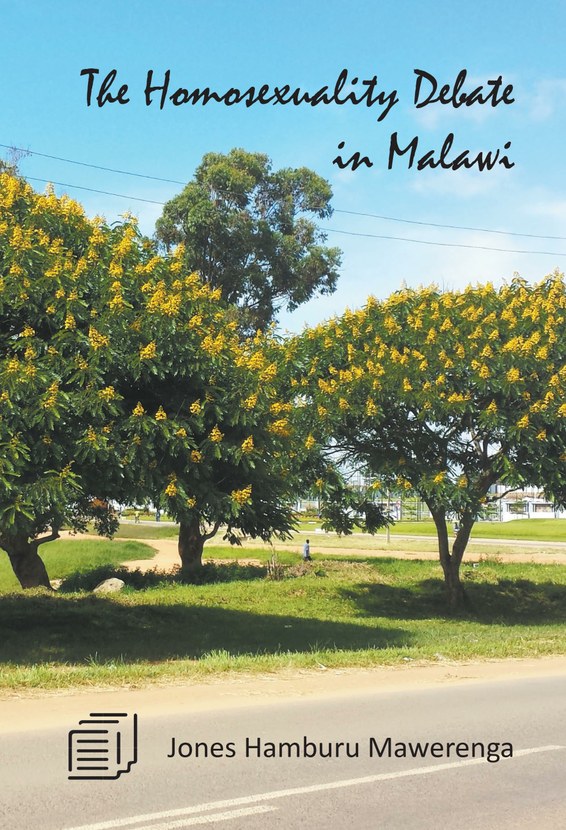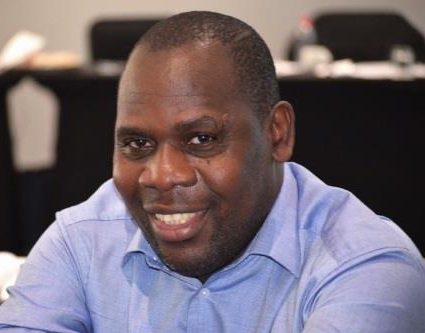
With new research revealing that 3.5 percent of adults in Malawi identify as Lesbian, Gay, Bisexual, Transgender or Intersex (LGBTI), some faith leaders are acknowledging the existence of sexual and gender minorities, and are preaching messages of love, peace, inclusion, respect and equality.
Baba Ngoza (not his real name) and his wife had many questions as they looked at their newborn baby’s ambiguous genitalia.
“What sin did we commit for this to happen to us?” Ngoza asked the gynecologist.
The doctor explained to the couple that many people have sexual characteristics that do not fit typical binary notions of male or female bodies.
He told them to be proud of their child, which he called a precious gift from God.
“People who have some aspects of the two sexes are intersex. It is God’s wish that the world should have diverse people,” Ngoza remembers the doctor saying.
Intersex people are born with sex characteristics, including chromosomes, hormones, genitals, or gonads that somehow diverge from what is typical for most male or female bodies.
While these characteristics may be visible at birth, like in the case of Ngoza’s baby, they sometimes become physically apparent at puberty or never at all.
When the Ngozas asked if being intersex was a condition that needed to be “corrected”, the doctor explained that being intersex is a naturally occurring variation in humans and that surgical intervention is seldom necessary.
After leaving the hospital, Ngoza headed to his pastor’s house to tell him about the sex of his baby. To Ngoza’s surprise, Pastor Esitedi Chikopa offered the same explanation as the doctor did, quoting Psalm 127:3, which says children are a gift from the Lord.
“People should not be infuriated because of diversities in religion, skin colour, ethnicity, gender identity, gender expression and sexual orientation,” Chikopa said in an interview.
Chikopa is not the only LGBTI affirming cleric in Malawi.
Rev. Dr Jones Mawerenga, a lecturer in Systematic Theology at the University of Malawi’s Chancellor College, laments that some faith leaders mistreat sexual and gender minorities, instead of welcoming them as deserving children of God.
“Many LGBTI citizens are religious and cherish their faith, but some, upon disclosing their identities, face discrimination, disciplinary hearings and even ex-communication in their churches,” Mawerenga said.
In his book “The Homosexuality Debate in Malawi,” Mawerenga observes that religion is one of the main factors hindering the process of decriminalising same-sex relations in the country.

“The religious affront to LGBTI discourse in Malawi is pervasive and fuels homophobia. Homophobia encompasses a range of negative attitudes and feelings towards lesbian, gay, bisexual, transgender, and intersex people. Its expression ranges from verbal abuse to violent attacks or criminalisation,” he said recently during a presentation at a media workshop in Zomba.
Mawerenga encourages religious leaders to contribute to the harmonious co-existence of Malawians of different sexual and gender identities, expressions and orientations.
“One way of creating that harmony is by looking at Jesus’ inclusive approaches,” Mawerenga said. “Jesus of the Gospels considers the church to be an inclusive one, with everyone welcome at the table. This should be able to inform the contemporary church in dealing with the LGBTI community in Malawi.”
Mawerenga sees a ray of hope as some clergy now welcome LGBTI people as members in their churches. Across the globe, growing numbers of religious leaders are creating and maintaining safe, inclusive, and equitable faith communities.
In 2013, Anglican Archbishop Emeritus Desmond Tutu advised clergy in Africa to embrace different sexual identities and practices in a fresh, mature and progressive manner.
“I would not worship a God who is homophobic,” Tutu said at the time. “I would refuse to go to homophobic heaven…I would much rather go to the other place.”
With messages of love, compassion, inclusion and respect for equality growing louder in LGBTI-affirming churches, new research suggests intersex people like Ngoza’s baby stand a better chance of enjoying social inclusion in the future.
In a new research report conducted by Afriscope and The Other Foundation titled “Under Wraps: A survey of public attitudes to homosexuality and gender non-conformity in Malawi,” 3.5 per cent of Malawians over the age of 16 identify as LGBTI. That number could be higher as 15 per cent of Malawians surveyed opted not to disclose their sexual orientation or gender identity.
Other findings from the survey include:
• 9 out of 10 Malawians said intersex people should be protected from violence.
• 1 out of 3 said that transgender people should be protected from violence and deserve the same human rights as all Malawians.
• 2 in 3 said they have not and will never be violent towards someone for being gender non-conforming.
One Blantyre-based intersex person interviewed for this story said the research findings represent a positive development for sexual and gender minorities in Malawi.
“The mere revelation that we exist – not just a few tens or a few hundred but thousands – should give food for thought to our policymakers,” said the source, whose name has been withheld to protect their identity. “During the recent national population census, I was humiliated as I was asked to declare myself as either male or female. I don’t belong to the two categories.”
Churches can be another source of humiliation when only men’s and women’s committees exist for congregants.
“I am a faithful Christian, but I am not a he or a she. My pronoun is they. I think it is only God who understands my situation,” the source said.
The Centre for the Development of the People (CEDEP), an NGO that advocates for the rights of sexual and gender minorities in Malawi, continues to call for the repeal of Malawi’s anti-homosexuality laws.
Same-sex sexual relations are illegal in Malawi under Sections 137, 153, 154 and 156 of the Penal Code and are punishable by up to 5 years imprisonment for women and up to 14 years for men.

CEDEP’s executive director Gift Trapence said these laws violate several international human rights treaties and the rights to non-discrimination, equality and privacy
The author is the executive director of Centre for Solutions Journalism
